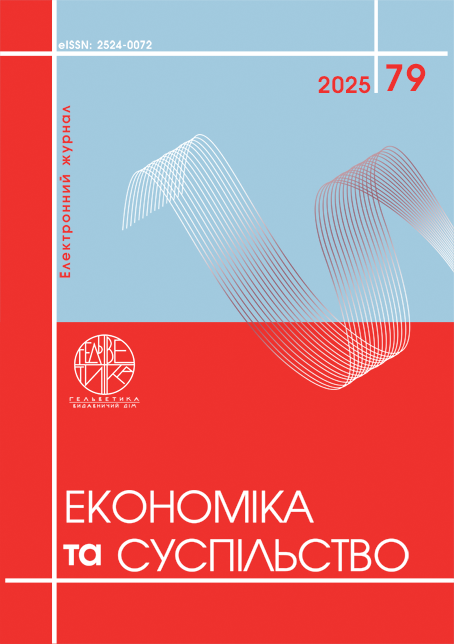INNOVATIVE APPROACHES TO HR POLICY FORMATION: CHALLENGES AND PROSPECTS IN THE CONTEXT OF DIGITAL TRANSFORMATION
Abstract
The article explores innovative approaches to the formation of personnel policy in the context of digital transformation, which significantly changes the rules of the labor market. Digitalization covers all aspects of personnel management - from recruitment to performance evaluation. Modern enterprises face challenges associated with the transition to hybrid and remote work formats, rapid technological change, the need to develop new digital competencies of employees, as well as the need to maintain a high level of motivation and engagement of personnel. In this context, personnel policy requires flexibility, adaptability and an innovative approach. Modern HR technologies play a key role in the transformation of personnel policy, in particular analytical tools, automated HRM systems, digital platforms for training, performance tracking, adaptation and communication. HR analytics allows you to make informed management decisions based on data, predict staff turnover risks, and determine the need for training and development. The introduction of digital platforms contributes to a personalized approach to learning, increasing the availability of educational resources and accelerating the adaptation of new employees. Automation of routine processes allows HR specialists to focus on strategic functions - developing personnel potential, forming leadership qualities and corporate culture. Special attention is paid to issues of supporting motivation, forming employee involvement and building a strong corporate identity. Digital technologies create new opportunities for feedback, internal communication, employee participation in decision-making processes, which strengthens the sense of involvement in common goals. At the same time, the digital environment requires a new approach to leadership, ethical norms for using data and ensuring psychological comfort in the team. The article also presents recommendations for improving the personnel policy of enterprises taking into account modern challenges: implementing mixed work models, developing digital skills, ensuring continuous learning, supporting inclusivity and equal opportunities, and modernizing performance assessment systems. All this is aimed at harmonizing the interests of employees and employers, increasing the flexibility of organizations, and strengthening their competitive advantages.
References
2. Борданова Л.С., Мельничук В.Е., Рощина Н.В., Семенченко Н.В. Конспект лекцій з навчальної дисципліни «Управління персоналом» : навчальний посібник. Київ : КПІ ім. Ігоря Сікорського, 2020. 103 с. Електронні текстові дані
3. Мельник І.В. HR-аналітика як інструмент розвитку персоналу в умовах трансформацій. 2020.
4. Скорик М.Л., Залюбінська Л.М. Сучасні методи управління персоналом. Київ : Видавництво Київського університету, 2019. 200 с.
5. Литвиненко Я.В. HR-аналітика в системі стратегічного управління персоналом. Бізнес-Інформ. 2020. № 4. С. 105–110.
6. Мачульська О.В. Сучасні тенденції розвитку кадрової політики в Україні. Економічний простір. 2022. № 178. С. 65–70.
7. Партин Г.О. Кадрова політика підприємства: економічні аспекти формування та реалізації : монографія. Івано-Франківськ : Нова Зоря, 2021. 198 с.
8. Бібліотека BukLib.net [Електронний ресурс]. URL: https://buklib.net/books/29156/ (дата звернення: 10.10.2025).
9. Хамел Ґ. Майбутнє менеджменту. Київ : Вид-во Старого Лева, 2009.
1. Bersin, J. (2021) HR Technology Disruptions for 2021. Deloitte Insights.
2. Bordanova, L. S., Melnychuk, V. E., Roshchyna, N. V., Semenchenko, N. V. (2020) Konspekt lektsii z navchalnoi dystsypliny «Upravlinnia personalom»: navchalnyi posibnyk [Lecture notes on the academic discipline 'Personnel Management': textbook]. Kyiv: KPI im. Ihoria Sikorskoho.
3. Melnyk, I. V. (2020) HR-analityka yak instrument rozvytku personalu v umovakh transformatsii [HR analytics as a tool for staff development under transformation].
4. Skoryk, M. L., Zaliubinska, L. M. (2019) Suchasni metody upravlinnia personalom [Modern methods of personnel management]. Kyiv: Vydavnytstvo Kyivskoho Universytetu.
5. Lytvynenko, Ya. V. (2020) HR-analityka v systemi stratehichnoho upravlinnia personalom [HR analytics in the system of strategic personnel management]. Biznes-Inform, no. 4, pp. 105–110.
6. Machulska, O. V. (2022) Suchasni tendentsii rozvytku kadrovoi polityky v Ukraini [Modern trends in personnel policy development in Ukraine]. Ekonomichnyi Prostir, no. 178, pp. 65-70.
7. Partyn, H. O. (2021) Kadrova polityka pidpryiemstva: ekonomichni aspekty formuvannia ta realizatsii: monohrafiia [Personnel policy of the enterprise: economic aspects of formation and implementation: monograph]. Ivano-Frankivsk: Nova Zoria.
8. Biblioteka BukLib.net [Electronic resource]. Available at: https://buklib.net/books/29156/ (accessed October 10, 2025).
9. Hamel, G. (2009) Maibutnie menedzhmentu [The Future of Management]. Kyiv: Vyd-vo Staroho Leva.


